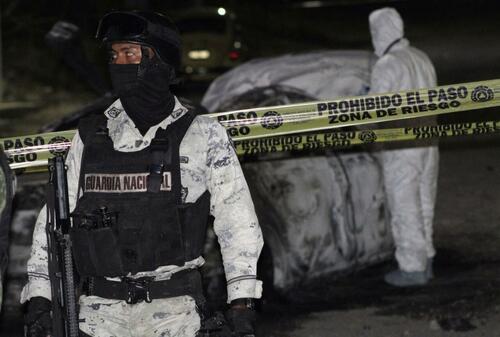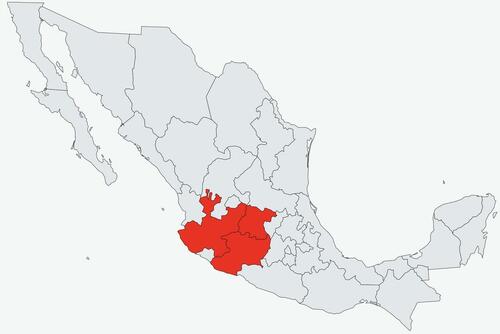
Behaving more and more like a military force, Mexican drug cartels have greatly increased their use of improvised explosive devices in their combat with authorities and rival criminal gangs, the Mexican army said on Tuesday.
Already this year, 42 police officers, soldiers and others have been wounded, nearly triple the count in 2022. Fatalities have included a National Guard officer and several police officers.

"All of these explosive devices are homemade, based on tutorials that can be found on the internet,” said Defense Secretary Luis Cresencio Sandoval. Most of the them use either readily-purchased black powder, or explosives stolen from Mexican mines. They're deployed in a variety of ways -- including roadside bombs, car bombs, and bombs dropped from drone aircraft.
Drone-bombings are surging: The tactic wasn't seen before 2020, but 260 such attacks have been tallied this year. "Even that number may be an underestimate: residents in some parts of the western state of Michoacan say that attacks by bomb-dropping drones are a near-daily occurrence," reports Associated Press.

The bombs often fail to explode, but when they do, the results can be catastrophic. July brought one of the most spectacular set of bombings yet -- as a coordinated series of seven road bombs killed four police and two civilians in what the governor of Jalisco called "a trap" targeting law enforcement. Four vehicles were destroyed and 14 people were injured by bombs so strong that they cratered the highway.
A majority of the explosive deployments have been recorded in Michoacán state, where the Jalisco cartel has long been at war with a federation of local gangs.
Bombings almost seem charming in contrast to a godawful cartel video that circulated from Mexico this week. It depicted the decapitation slaughter of five kidnapping victims. Traveling to attend a festival in Jalisco, they were apparently lured with a bogus employment opportunity, with the intent of forcing them to work for the cartel. Authorities believe they refused. Most horrifically, the video seemed to depict one of the victims being forced to bludgeon and decapitate another, before being killed himself.
For Mexicans, the video resurrected memories of a 2010 incident in which abducted men who refused to serve the cartel were forced to fight each other until death with sledgehammers. Let's pray these horrors stay south of the border.
Open floodgates at Arizona border allowing thousands of migrants to walk into the country
— Wall Street Silver (@WallStreetSilv) August 23, 2023
🔥🔥🔥
🔊 pic.twitter.com/RaZRYAVf7S
Behaving more and more like a military force, Mexican drug cartels have greatly increased their use of improvised explosive devices in their combat with authorities and rival criminal gangs, the Mexican army said on Tuesday.
Already this year, 42 police officers, soldiers and others have been wounded, nearly triple the count in 2022. Fatalities have included a National Guard officer and several police officers.

“All of these explosive devices are homemade, based on tutorials that can be found on the internet,” said Defense Secretary Luis Cresencio Sandoval. Most of the them use either readily-purchased black powder, or explosives stolen from Mexican mines. They’re deployed in a variety of ways — including roadside bombs, car bombs, and bombs dropped from drone aircraft.
Drone-bombings are surging: The tactic wasn’t seen before 2020, but 260 such attacks have been tallied this year. “Even that number may be an underestimate: residents in some parts of the western state of Michoacan say that attacks by bomb-dropping drones are a near-daily occurrence,” reports Associated Press.

The bombs often fail to explode, but when they do, the results can be catastrophic. July brought one of the most spectacular set of bombings yet — as a coordinated series of seven road bombs killed four police and two civilians in what the governor of Jalisco called “a trap” targeting law enforcement. Four vehicles were destroyed and 14 people were injured by bombs so strong that they cratered the highway.
A majority of the explosive deployments have been recorded in Michoacán state, where the Jalisco cartel has long been at war with a federation of local gangs.
Bombings almost seem charming in contrast to a godawful cartel video that circulated from Mexico this week. It depicted the decapitation slaughter of five kidnapping victims. Traveling to attend a festival in Jalisco, they were apparently lured with a bogus employment opportunity, with the intent of forcing them to work for the cartel. Authorities believe they refused. Most horrifically, the video seemed to depict one of the victims being forced to bludgeon and decapitate another, before being killed himself.
For Mexicans, the video resurrected memories of a 2010 incident in which abducted men who refused to serve the cartel were forced to fight each other until death with sledgehammers. Let’s pray these horrors stay south of the border.
Open floodgates at Arizona border allowing thousands of migrants to walk into the country
🔥🔥🔥— Wall Street Silver (@WallStreetSilv) August 23, 2023
Loading…





